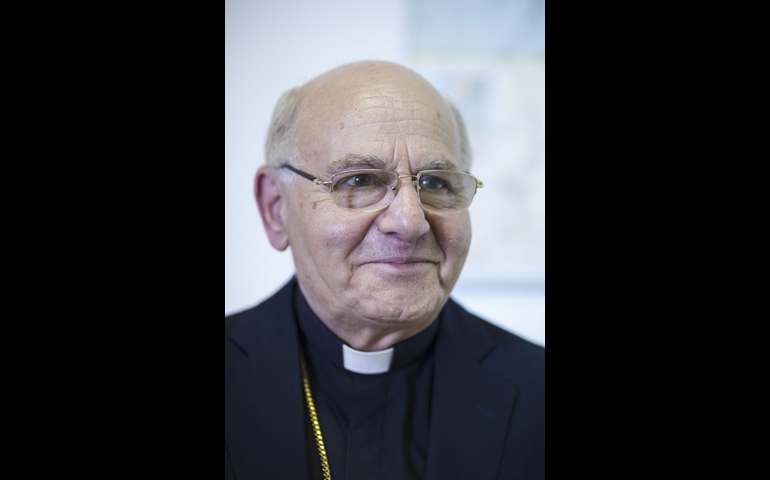
Melkite Archbishop Jean-Clement Jeanbart of Aleppo, Syria (Aid to the Church in Need)
Melkite archbishop of Aleppo, Syria, Jean-Clément Jeanbart, was invited by NCR to share his reaction to Pope Francis' speech to over 150 world leaders at the United Nations this past Friday. Archbishop Jeanbart has been in the U.S. over the past several months in order to raise awareness of the plight of Syrian Christians and non-Christians facing deadly attacks by ISIS and being caught between the waring ISIS militia and the Syrian government forces.
In April 2015, NCR interviewed Jeanbart about what is happening in Aleppo.
Related: Catholic Near East partners with the Vatican to help Syrian families
In August, he attended the Knights of Columbus annual convention when the organization announced a new Christian Refugee Relief Fund to support Christians in Iraq and Syria. In addition, Jeanbart has received significant financial support from the Aid to the Church in Need. This organization's U.S. chairman, George Marlin, wrote an op-ed on the plight of the Iraqi and Syrian Christians that appeared last week.
Iraqi and Syrian Christians, among others, have also received practical assistance from the New York City-based Catholic Near East Welfare Association, a pontifical mission.
Archbishop Jeanbart's essay below was submitted to NCR in French and was translated by NCR into English. Any errors in the translation are the responsibility of NCR.
This address to practically all the leaders of the world's countries, touching upon the various problems facing human society at the beginning of the third millennium, did not fail to speak of justice, the right to a decent human life, exclusion, degradation of the human being, respect for human life and the environment, integral development and the war he considers to be a negation of all rights. It was a magnificent discourse which deserves numerous and diverse in-depth analyses. One could say it calls for a new interpretation and an updating of the Charter of the United Nations to mark its 70th anniversary.
In a few sentences I would like to limit myself to a few comments about the war, from which we suffer the pain at present in Syria and which the Holy Father did not fail to condemn in his discourse. I can point out that the Holy Father dealt with the violence we are suffering from four angles.
He spoke of the war directly in carefully reiterating his "incessant appeals concerning the tragic situation throughout the Middle East," and mentioning our country by name. He did not fail on this point to speak of the suffering inflicted on minorities, and especially the Christians "forced to witness the destruction of their places of worship, their cultural and religious heritage … [and] that they are confronted with the alternatives of either fleeing or paying with their own lives.
He has called the international decision-makers to an examination of conscience, recalling that what is at stake are not just "partisan interests," but "real human beings … who weep, suffer, and die." The international community "must do all it that is in its power to prevent further systematic violence. …"
[The world] has to act and not limit itself to the enumeration of "problems, strategies and discussions" in order not to fall into the trap that he describes as a 'bureaucratic exercise of drawing up long lists of good proposals -- goals, objectives and statistical indicators … or [to think in terms of] "a single theoretical and aprioristic solution [that] will provide an answer to all the challenges." What must be avoided is an "ideological colonization by the imposition of anomalous models and lifestyles which are alien to people's identity and, in the end, irresponsible. To act, that is to say negotiate, that is a right recognized by the UN Charter, which, applied faithfully, "will obtain peaceful results." It is such a political solution that can put an end to the war in Syria.
Finally, negotiations require first of all that an end be put to the "the proliferation of arms … [and that requires] coordination among the members of the international community," without failing to take into account the feeble but crucial role of the countries directly involved [in the war]. That is the sine qua non of any successful negotiation. I have in mind the 258 letters of appeal presented by Syria to the head of the U.N. during the four years of the Syrian civil war, letters which received no response and which were ignored because of an abuse of power on the part of the most influential countries. In this context, the pope insists that "the limitation of power is an idea implicit in the concept of law itself. … [N]o human individual or group can consider itself absolute, permitted to bypass the dignity and the rights of other individuals.
[Tom Gallagher is a regular contributor to the NCR and lead writer for the newspaper's Mission Management column.]




